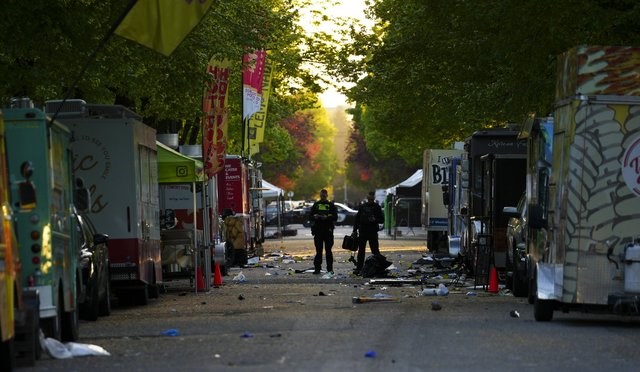
Members of the Vancouver Police forensics team examine the scene where a vehicle drove into a crowd at a Lapu Lapu Day street festival Saturday evening in Vancouver, Sunday, April 27, 2025. THE CANADIAN PRESS/Sean Kilpatrick
Republished April 30, 2025 - 11:38 AM
Original Publication Date April 30, 2025 - 8:36 AM
TORONTO - The deadly attack on a Vancouver street festival has prompted event organizers across Canada to comb over their security practices in a bid to protect attendees and assure them festivals are safe.
Some planners had already begun that process when British Columbia Premier David Eby announced Tuesday he would call an independent commission to investigate how other regions handle festival security, to ensure residents of his province feel confident going to community events this summer.
But some say a spate of international attacks in recent years and increased demands from insurance companies meant they were already attuned to the issue — particularly given the rising cost associated with security.
"You prepare, you anticipate, but nobody could have imagined what happened last Saturday," said Kelly Kurta, executive director of the Greater Victoria Festival Society. "Nobody."
Eleven people were killed and dozens more were injured when a man drove an SUV into the crowd at the Lapu Lapu Day festival in Vancouver on Saturday night. Vancouver Police Chief Steve Rai said a risk assessment was conducted before the event and police had decided no heavy-vehicle barricades were necessary. He said he's confident in that assessment, but they'll review the decision regardless.
In Victoria, Kurta's organization handles many of the public events, including the Victoria Day Parade, which will wind its way through the city for the 125th time in just a few weeks.
She said she got in touch with police and the fire department on Sunday morning to make sure there wasn't more they could do to further secure their event.
The plans were already fairly comprehensive, she said, but they might bring in more vehicles to barricade parade routes.
Kurta said security is always top of mind for event organizers, in part because it's also at the top of the budget. She said roughly 75 per cent of her funding goes toward "risk management." All events have an "emergency action plan" that includes police, fire, and often private security and medics.
She often partners with St. John Ambulance for medical services, and they have a team on bicycles to move swiftly through barricaded areas.
Event organizers don't have to pay for policing, but Kurta said barricades, emergency action plans and added traffic control come out of the festival budget.
Heidi Barlow-Lee, who owns HBL Events in Victoria, said she spends months planning security measures and risk management in collaboration with police.
And while others are celebrating, she said organizers are always planning for the worst.
"It's always, as the event person and the operations manager, in the back of your head all the things that can go wrong," she said.
"It really is your absolute worst nightmare," she said of Saturday.
The tragedy's reach extends beyond the West Coast.
The City of Toronto is organizing a Festival Safety Summit for May 26 to "discuss event safety measures and potential future enhancements" as a direct response to the attack, said spokeswoman Laura McQuillan.
There's a planning meeting for that summit scheduled for Thursday.
Last year, the City of Toronto announced the Special Events Stabilization Initiative, a funding program meant to cover some expenses related to health, safety and security, including fire and paramedic services, and "hostile vehicle mitigation," which is a security measure meant to lower the threat of a criminal or terrorist attack.
The money was a one-time grant for organizers hosting events in an outdoor public space in 2024, and McQuillan said it will return for 2025.
She noted that all event organizers are required to arrange a traffic management plan that includes barricades and "road closed" signs, as well as event marshals and security in those places.
"While hostile vehicle mitigation measures are not a formal requirement for every event, the City and its partners identify and assess potential threats during the event planning process, including identifying high-risk events where hostile vehicle mitigation measures should be implemented," McQuillan wrote in an email.
Dave MacNeil, CEO of industry group Festivals and Events Ontario, said vehicle attacks were already on his members' radars because of a rampage in New Orleans during a New Year's party in January. Fourteen people were killed when a man sped around a police blockade, and dozens more were injured.
He said they're always re-evaluating their practices, particularly when something goes wrong — no matter where in the world it happens. For instance, he said, event organizers looked at their own vulnerabilities during a 2017 shooting that left 57 people dead at a music festival in Las Vegas, and updated their security plans to account for the possibility of an attack from above.
"We have to sit down and really look at it through the lens of what else could possibly happen, what could possibly go wrong. And every time something like that happens, wherever it is around the world, it always comes back to impact all of us," MacNeil said.
But with all these considerations, he said the high cost of security can make hosting large events difficult.
"Risk management is one of those things that's making it harder and harder to execute events," he said. "It's what's making them more and more expensive to execute, to insure."
This report by The Canadian Press was first published April 30, 2025.
News from © The Canadian Press, 2025